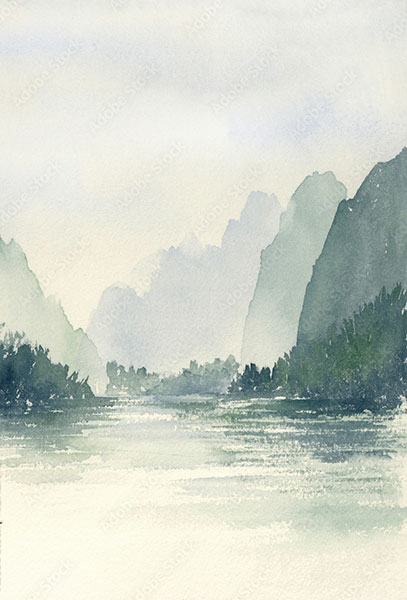The Writings of Kwang-dze Translated by James Legge
![]()
BOOK XXVII. YÜ YEN.
Yü Yen, ‘Metaphorical Words,’ stand at the commencement of the Book, and have been adopted as its name.
{p. 156}
They might be employed to denote its first paragraph, but are not applicable to the Book as a whole. Nor let the reader expect to find even here any disquisition on the nature of the metaphor as a figure of speech. Translated literally, ‘Yü Yen’ are ‘Lodged Words,’ that is, Ideas that receive their meaning or character from their environment, the narrative or description in which they are deposited.
Kwang-dze wished, I suppose, to give some description of the style in which he himself wrote:-now metaphorical, now abounding in quotations, and throughout moulded by his Tâoistic views. This last seems to be the meaning of his Kih Yen,–literally, ‘Cup, or Goblet, Words,’ that is, words, common as the water constantly supplied in the cup, but all moulded by the Tâoist principle, the element of and from Heaven blended in man’s constitution and that should direct and guide his conduct. The best help in the interpretation of the paragraph is derived from a study of the difficult second Book, as suggested in the notes.
Of the five paragraphs that follow the first, the second relates to the change of views, which, it is said, took place in Confucius; the third, to the change of feeling in Zäng-dze in his poverty and prosperity; the fourth, to changes of character produced in his disciple by the teachings of Tung-kwo Dze-khî; the fifth, to the changes in the appearance of the shadow produced by the ever-changing substance; and the sixth, to the change of spirit and manner produced in Yang Kû by the stern lesson of Lâo-dze.
Various other lessons, more or less appropriate and important, are interspersed.
Some critics argue that this Book must have originally been one with the thirty-second, which was made into two by the insertion between its Parts of the four spurious intervening Books, but this is uncertain and unlikely.
BOOK XXVIII. ZANG WANG.
Zang Wang, explaining the characters as I have done,
{p. 157}
fairly indicates the subject-matter of the Book. Not that we have a king in every illustration, but the personages adduced are always men of worth, who decline the throne, or gift, or distinction of whatever nature, proffered to them, and feel that they have something better to live for.
A persuasion, however, is widely spread, that this Book and the three that follow are all spurious. The first critic of note to challenge their genuineness was Sû Shih (better known as Sû Tung-pho, A. D. 1046-1101); and now, some of the best editors, such as Lin Hsî-kung, do not admit them into their texts, while others who are not bold enough to exclude them altogether, do not think it worth their while to discuss them seriously. Hû Wän-ying, for instance, says, ‘Their style is poor and mean, and they are, without doubt, forgeries. I will not therefore trouble myself with comments of praise or blame upon them. The reader may accept or reject them at his pleasure.’
But something may be said for them. Sze-mâ Khien seems to have been acquainted with them all. In his short biographical notice of Kwang-dze, he says, ‘He made the Old Fisherman, the Robber Kih, and the Cutting Open Satchels, to defame and calumniate the disciples of Confucius.’ Khien does not indeed mention our present Book along with XXX and XXXI, but it is less open to objection on the ground he mentions than they are. I think if it had stood alone, it would not have been condemned.
BOOK XXIX. TÂO KIH.
It has been seen above that Sze-mâ Khien expressly ascribes the Book called ‘the Robber Kih’ to Kwang-dze. Khien refers also in another place to Kih, adducing the facts of his history in contrast with those about Confucius’ favourite disciple Yen Hui as inexplicable on the supposition of a just and wise Providence. We must conclude therefore that the Book existed in Khien’s time, and that he had read it. On the other hand it has been shown that Confucius could not have been on terms
{p. 158}
of friendship with Liû-hsiâ Kî, and all that is related of his brother the robber wants substantiation. That such a man ever existed appears to me very doubtful. Are we to put down the whole of the first paragraph then as a jeu d’esprit on the part of Kwang-dze, intended to throw ridicule on Confucius and what our author considered his pedantic ways? It certainly does so, and we are amused to hear the sage outcrowed by the robber.
In the other two paragraphs we have good instances of Kwang-dze’s ‘metaphorical expressions,’ his coinage of names for his personages, more or less ingeniously indicating their characters; but in such cases the element of time or chronology does not enter; and it is the anachronism of the first paragraph which constitutes its chief difficulty.
The name of ‘Robber Kih’ may be said to be a coinage; and that a famous robber was popularly indicated by the name appears from its use by Mencius (III, ii, ch. 10, 3), to explain which the commentators have invented the story of a robber so-called in the time of Hwang-Tî, in the twenty-seventh century B. C.! Was there really such a legend? and did Kwang-dze take advantage of it to apply the name to a notorious and disreputable brother of Liû-hsiâ Kî? Still there remain the anachronisms in the paragraph which have been pointed out. On the whole we must come to a conclusion rather unfavourable to the genuineness of the Book. But it must have been forged at a very early time, and we have no idea by whom.
BOOK XXX. YÜEH KIEN.
We need not suppose that anything ever occurred in Kwang-dze’s experience such as is described here. The whole narrative is metaphorical; and that he himself is made to play the part in it which he describes, only shows how the style of writing in which he indulged was ingrained into the texture of his mind. We do not know that there ever was a ruler of Kâo who indulged in the love of the
{p. 159}
sword-fight, and kept about him a crowd of vulgar bravoes such as the story describes. We may be assured that our author never wore the bravo’s dress or girt on him the bravo’s sword. The whole is a metaphorical representation of the way in which a besotted ruler might be brought to a feeling of his degradation, and recalled to a sense of his duty and the way in which he might fulfil it. The narrative is full of interest and force. I do not feel any great difficulty in accepting it as the genuine composition of Kwang-dze. Who but himself could have composed it? Was it a good-humoured caricature of him by an able Confucian writer to repay him for the ridicule he was fond of casting on the sage?
BOOK XXXI. YÜ-FÛ.
‘The Old Fisherman’ is the fourth of the Books in the collection of the writings of Kwang-dze to which, since the time of Sû Shih, the epithet of ‘spurious’ has been attached by many. My own opinion, however, has been already intimated that the suspicions of the genuineness of those Books have been entertained on insufficient grounds; and so far as ‘the Old Fisherman’ is concerned, I am glad that it has come down to us, spurious or genuine. There may be a certain coarseness in ‘the Robber Kih,’ which makes us despise Confucius or laugh at him; but the satire in this Book is delicate, and we do not like the sage the less when he walks up the bank from the stream where he has been lectured by the fisherman. The pictures of him and his disciples in the forest, reading and singing on the Apricot Terrace, and of the old man slowly impelling his skiff to the land and then as quietly impelling it away till it is lost among the reeds, are delicious; there is nothing finer of its kind in the volume. What hand but that of Kwang-dze, so light in its touch and yet so strong, both incisive and decisive, could have delineated them?
{p. 160}
BOOK XXXII. LIEH YÜ-KHÂU.
Lieh Yü-khâu, the surname and name of Lieh-dze, with which the first paragraph commences, have become current as the name of the Book, though they have nothing to do with any but that one paragraph, which is found also in the second Book of the writings ascribed to Lieh-dze. There are some variations in the two Texts, but they are so slight that we cannot look on them as proofs that the two passages are narratives of independent origin.
Various difficulties surround the questions of the existence of Lieh-dze, and of the work which bears his name. They will be found distinctly and dispassionately stated and discussed in the 146th chapter of the Catalogue of the Khien-lung Imperial Library. The writers seem to me to make it out that there was such a man, but they do not make it clear when he lived, or how his writings assumed their present form. There is a statement of Liû Hsiang that he lived in the time of duke Ma of Käng (B.C. 627-606); but in that case he must have been earlier than Lâo-dze himself, whom he very frequently quotes. The writers think that Lift’s ‘Mû of Käng’ should be Mû of Lû (B.C. 409-377), which would make him not much anterior to Mencius and Kwang-dze; but this is merely an ingenious conjecture. As to the composition of his chapters, they are evidently not at first hand from Lieh, but by some one of his disciples; whether they were current in Kwang-dze’s days, and be made use of various passages from them, or those passages were Kwang-dze’s originally, and taken from him by the followers of Lieh-dze and added to what fragments they had of their master’s teaching;–these are points which must be left undetermined.
Whether the narrative about Lieh be from Kwang-dze or not, its bearing on his character is not readily apprehended; but, as we study it, we seem to understand that his master Wû-zän condemned him as not having fully attained to the Tâo, but owing his influence with others
{p. 161}
mainly to the manifestation of his merely human qualities. And this is the lesson which our author keeps before him, more or less distinctly, in all his paragraphs. As Lû Shû-kih. says:–
‘This Book also sets forth Doing Nothing as the essential condition of the Tâo. Lieh-dze, frightened at the respect shown to him by the soup-vendors, and yet by his human doings drawing men to him, disowns the rule of the heavenly; Hwan of Käng, thinking himself different from other men, does not know that Heaven recompenses men according to their employment of the heavenly in them; the resting of the sages in their proper rest shows how the ancients pursued the heavenly and not the human; the one who learned to slay the Dragon, but afterwards did not exercise his skill, begins with the human, but afterwards goes on to the heavenly; in those who do not rest in the heavenly, and perish by the inward war, we see how the small men do not know the secret of the Great Repose; Zhâo Shang, glorying in the carriages which he had acquired, is still farther removed from the heavenly; when Yen Ho shows that the sage, in imparting his instructions, did not follow the example of Heaven in diffusing its benefits, we learn that it is only the Doing Nothing of the True Man which is in agreement with Heaven; the difficulty of knowing the mind of man, and the various methods required to test it, show the readiness with which, when not under the rule of Heaven, it seems to go after what is right, and the greater readiness with which it again revolts from it; in Khao-fû, the Correct, we have one indifferent to the distinctions of rank, and from him we advance to the man who understands the great condition appointed for him, and is a follower of Heaven; then comes he who plays the thief under the chin of the Black Dragon, running the greatest risks on a mere peradventure of success, a resolute opponent of Heaven; and finally we have Kwang-dze despising the ornaments of the sacrificial ox, looking in the same way at the worms beneath and the kites overhead, and regarding himself as quite independent
{p. 162}
of them, thus giving us an example of the embodiment of the spiritual, and of harmony with Heaven.’
So does this ingenious commentator endeavour to exhibit the one idea in the Book, and show the unity of its different paragraphs.
BOOK XXXIII. THIEN HSIÂ.
The Thien Hsiâ with which this Book commences is in regimen, and cannot be translated, so as to give an adequate idea of the scope of the Book, or even of the first paragraph to which it belongs. The phrase itself means literally ‘under heaven or the sky,’ and is used as a denomination of ‘the kingdom,’ and, even more widely, of the world’ or ‘all men.’ ‘Historical Phases of Tâoist Teaching’ would be nearly descriptive of the subject-matter of the Book; but may be objected to on two grounds:–first, that a chronological method is not observed, and next, that the concluding paragraph can hardly be said to relate to Tâoism at all, but to the sophistical teachers, which abounded in the age of Kwang-dze.
Par. 1 sketches with a light hand the nature of Tâoism and the forms which it assumed from the earliest times to the era of Confucius, as imperfectly represented by him and his school.
Par. 2 introduces us to the system of Mo Tî and his school as an erroneous form of Tâoism, and departing, as it continued, farther and farther from the old model.
Par. 3 deals with a modification of Mohism, advocated by scholars who are hardly heard of elsewhere.
Par. 4 treats of a further modification of this modified Mohism, held by scholars ‘whose Tâo was not the true Tâo, and whose “right” was really “wrong.”‘
Par. 5 goes back to the era of Lâo-dze, and mentions him and Kwan Yin, as the men who gave to the system of Tâo a grand development.
Par. 6 sets forth Kwang-dze as following in their steps and going beyond them, the brightest luminary of the system.
{p. 163}
Par. 7 leaves Tâoism, and brings up Hui Shih and other sophists.
Whether the Book should be received as from Kwang-dze himself or from some early editor of his writings is ‘a vexed question.’ If it did come from his pencil, he certainly had a good opinion of himself. It is hard for a foreign student at this distant time to be called on for an opinion on the one side or the other.

OPENING HOURS
| Week Days | 8:00 – 5:00 |
| Saturday | 9:00 – 5:00 |
| Sunday | 11:00 – 4:00 |




